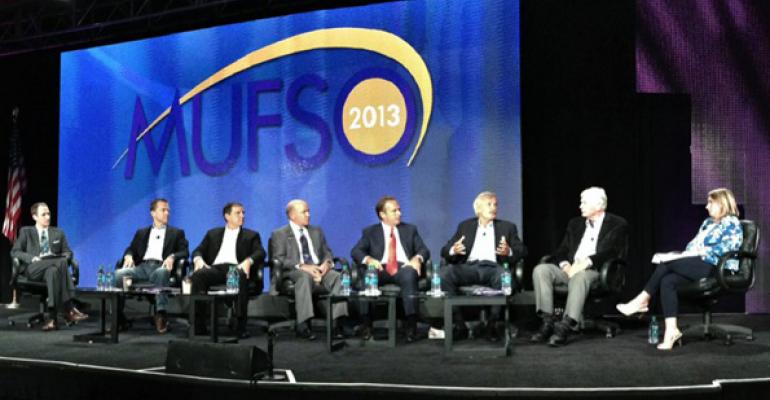Gathering at MUFSO CEO Panel the morning after the federal government shut down, restaurant leaders acknowledged that government regulation would remain a concern over the next several years, but remained optimistic that the industry could overcome challenges with the right strategies.
“You should make sure you get involved and engaged in advocacy to protect our business as we go forward, because who knows what’s going to happen in the next seven years,” said Arby’s chairman Jon Luther, winner of this year’s Norman Award. “The decisions that are made today can affect our businesses.”
To that point, Luther added, investments being made today in technology, supply chain, and culinary research and development would benefit the restaurant industry, as would foodservice’s continuing development of its people.
RELATED
• Ray Blanchette of Joe’s Crab Shack named 2013 Operator of the Year
• Coach Rick Pitino delivers MUFSO keynote speech
• More restaurant executive news
“Brands have to take a look at who they are today and what they want to look like in 10 years, and you can’t continue to do the same thing you’re doing today,” Luther said. “Norman [Brinker] said one time that you have to continue to grow, because if you stand still, you’ll be obsolete.”
The Golden Chain honorees joining Luther on stage agreed that evolving their brands and developing their people would carry them through whatever challenges arise.
“What’s the most bullish word you could come up with?” Ignite Restaurant Group chief executive Ray Blanchette, who was named Operator of the Year at MUFSO on Oct. 1, responded when asked for his projection for the next few years. “People are naturally aspirational, and when you look across the world, there are countries with massive emerging middle classes. … These folks are developing buying power and ultimately are going to be a disruptive force.”
Blanchette, who was recognized for turning around and growing Joe’s Crab Shack, added that the growing economic influence of Millennials would benefit the industry, as would advances in technology.
Putting people first
(Continued from page 1)
Chick-fil-A president Dan Cathy said his chain’s “second-mile service” is what steered the brand to sales growth in 2012, despite disruption resulting from a controversy over his remarks on “traditional marriage.” Chick-fil-A’s drive to differentiate itself through service has resulted in a 97-percent retention rate, he said.
“If you just want to give customers what they paid for, the first mile, it’s just a transaction,” he said. “They’re going to go next door for the discounted price. But if you’re going to have a relationship with that customer, you’ll have to give him the unexpected, and so we went to upscale restaurants to see what they do better. … We instilled in our people the practices and phrases you’d expect from a fine-dining experience.”
Kelly Baltes, chief executive of Cheddar's Casual Café, similarly said the casual-dining brand aspires to “greatness” through customer service every day.
“It’s all about the people,” Baltes said. “Casual dining is a pure market-share game; you are either a taker or a giver. For us, we don’t typically do traditional advertising. It’s purely word-of-mouth. We’re as good as who we take care of today in our restaurants.”
The same is true for Corner Bakery Café, chief executive Michael Hislop said, which is why the fast-casual chain employs more people than in years past to constantly listen to and respond to guests in the restaurants and on social media. While the tactics by which Corner Bakery interacts with guests has changed, the core principles behind what makes a restaurant run smoothly largely has not for decades, he said.
“To me, it’s always been people, sales, profit and growth, and they go in that line,” he said. “People are the key. You have to have a general manager who can connect with the employees and then be able to connect with the guest. … A great GM is worth so many thousands of dollars a week.”
Training also has been the most important element behind the growth of Jersey Mike’s Subs, chief executive of Jersey Mike’s Franchise Systems Inc. Peter Cancro said. He noted specifically the training of new franchisees, who now work in an established Jersey Mike’s location for two and a half months — which coincides with the construction period for new restaurants — to learn all facets of operations.
What the new franchisees learn best of all during Jersey Mike’s training program is how to provide the genuine hospitality that makes customers feel that the appreciation they notice is real, Cancro said.
“Our motto when they come through the door is to ‘share the life of the customer,’” Cancro said. “I think people really love that about our company.”
The CEO Panel was sponsored by SurveyMini by SMG.
Contact Mark Brandau at [email protected].
Follow him on Twitter: @Mark_from_NRN





